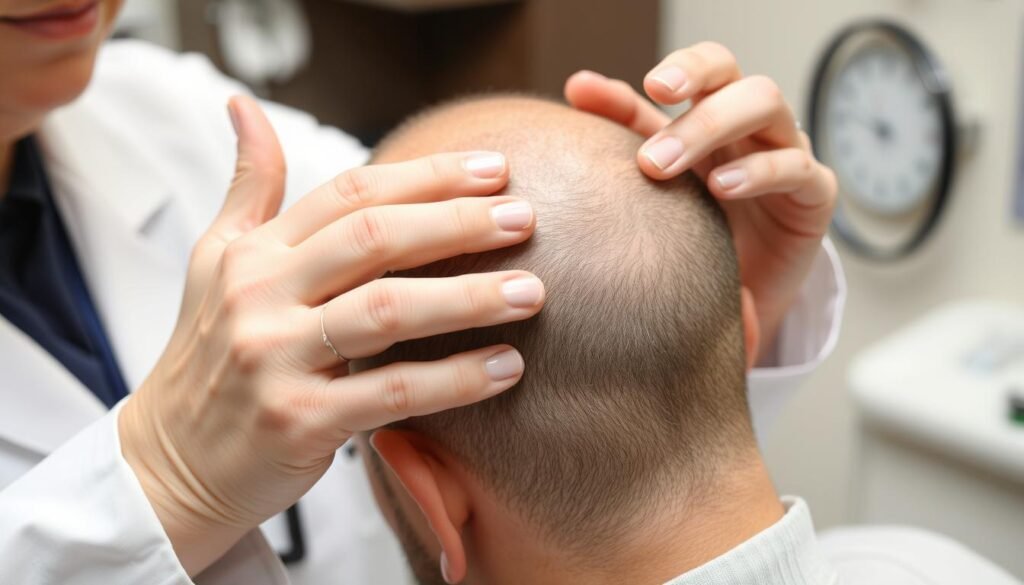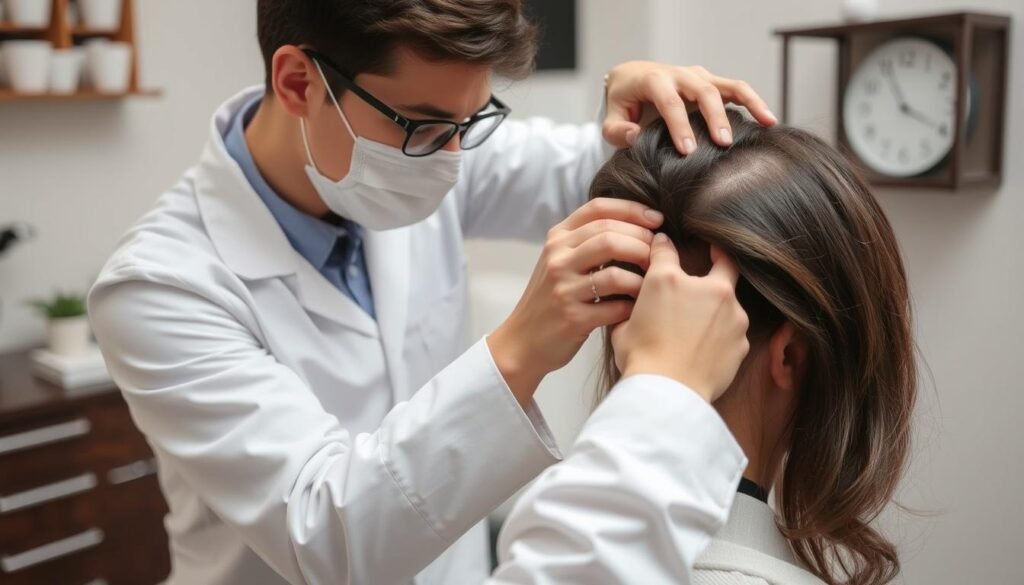Hair loss is a widespread concern affecting millions of Americans, significantly impacting their self-esteem and quality of life. It’s not just a cosmetic issue; it can be a sign of an underlying health problem that requires professional care.
Seeking advice from a healthcare professional is crucial for a proper diagnosis and effective treatment of hair loss conditions. Early intervention can prevent further hair loss and potentially restore lost hair in many cases. Consulting the right specialist is key to addressing specific types of hair loss effectively.
This guide will walk you through the different types of medical professionals who specialize in hair loss treatment, helping you navigate the healthcare system to find the most appropriate doctor for your specific concerns.
Key Takeaways
- Understanding the prevalence and impact of hair loss.
- The importance of seeking professional medical advice for hair loss.
- Benefits of early intervention in preventing further hair loss.
- Types of medical professionals who specialize in hair loss treatment.
- Guidance on finding the right doctor for specific hair loss concerns.
Understanding Hair Loss and Its Causes
Hair loss can be a distressing experience, and identifying its causes is the first step towards addressing it. Hair loss, also known as alopecia, can manifest in various forms and can be triggered by a multitude of factors. Understanding these causes is crucial for determining the appropriate treatment.
Common Types of Hair Loss
Hair loss can be categorized into several types, including androgenetic alopecia, telogen effluvium, and alopecia areata. Androgenetic alopecia, also known as male/female pattern baldness, is the most common form, influenced by genetics and hormonal factors.
Factors That Contribute to Hair Loss
Several factors contribute to hair loss, including genetics, hormonal imbalances, nutritional deficiencies, certain medications, scalp conditions, and stress. For instance, thyroid disorders and PCOS can lead to hair loss due to hormonal imbalances. A consultation with a specialist can help identify the underlying cause.
| Cause | Description |
|---|---|
| Genetics | Family history plays a significant role in androgenetic alopecia. |
| Hormonal Imbalance | Thyroid disorders, PCOS, and changes during pregnancy or menopause. |
| Nutritional Deficiencies | Lack of iron, protein, zinc, and vitamins B and D. |
| Medications | Certain drugs for blood pressure, depression, arthritis, and cancer treatments. |
For Hair Loss Which Doctor to Consult: Primary Options
The journey to addressing hair loss begins with understanding which medical professional to consult. When it comes to hair loss, there are several types of doctors you can see, each with their own specialty.
Dermatologists: The Hair and Scalp Specialists
Dermatologists are medical doctors who specialize in the diagnosis and treatment of skin, hair, and scalp conditions. They are a primary option for treating hair loss because they can identify underlying causes and provide targeted treatments.

Trichologists: Focused on Hair Health
Trichologists are specialists who focus on the health of hair and scalp. While they are not medical doctors, they can provide valuable insights into hair care and help identify issues related to hair loss.

Primary Care Physicians: Your First Step
Your primary care physician can be a good starting point for addressing hair loss. They can perform initial evaluations, order blood tests to check for underlying health conditions, and provide referrals to specialists if needed.
For instance, if you’re experiencing hair loss, your primary care physician can help identify simple causes and recommend basic treatments or lifestyle changes. It’s essential to bring up hair loss concerns during regular check-ups, as they may be indicators of other health issues.
While you wait for your appointment with the dermatologist, feel free to consult your pharmacist or primary care physician for initial guidance.
Specialized Doctors for Specific Hair Loss Conditions
Specialized doctors play a crucial role in treating specific hair loss conditions. Depending on the underlying cause, different specialists may be consulted to address the issue effectively.
Endocrinologists for Hormone-Related Hair Loss
Endocrinologists are crucial for diagnosing and treating hair loss related to hormonal imbalances. Hormonal issues, such as thyroid disorders, can lead to significant hair loss. An endocrinologist can provide targeted treatments to address these hormonal imbalances.

Hair Transplant Surgeons for Advanced Treatment
For individuals experiencing advanced hair loss, hair transplant surgeons offer a viable solution. They perform surgical procedures to restore hair growth in balding areas. This advanced treatment can significantly improve the appearance and confidence of those affected.

What to Expect During Your Consultation
During your consultation with a hair loss specialist, you can expect a thorough examination of your scalp and hair. The doctor will likely discuss your medical history, lifestyle, and previous treatments. This comprehensive approach helps in achieving an accurate diagnosis and devising an effective treatment plan.
Conclusion: Making the Right Choice for Your Hair Loss Treatment
Effective hair loss treatment hinges on consulting the right doctor for your specific condition. Various medical professionals, including dermatologists, trichologists, and primary care physicians, specialize in treating hair loss. For most conditions, a dermatologist is the best initial consultant due to their expertise in skin and scalp conditions.
When choosing a specialist, consider your symptoms, suspected causes, and the severity of your hair loss. Early intervention is crucial for better treatment outcomes, as many forms of alopecia respond more effectively to prompt treatment. A multi-disciplinary approach may be necessary, involving several specialists. Additionally, acknowledging the emotional impact of hair loss and considering psychological support can be beneficial.
By being proactive about your hair health and seeking the right specialist, you can improve your chances of effective hair loss treatment. Advances in treatments continue to enhance outcomes for various types of alopecia, offering hope for those affected.


